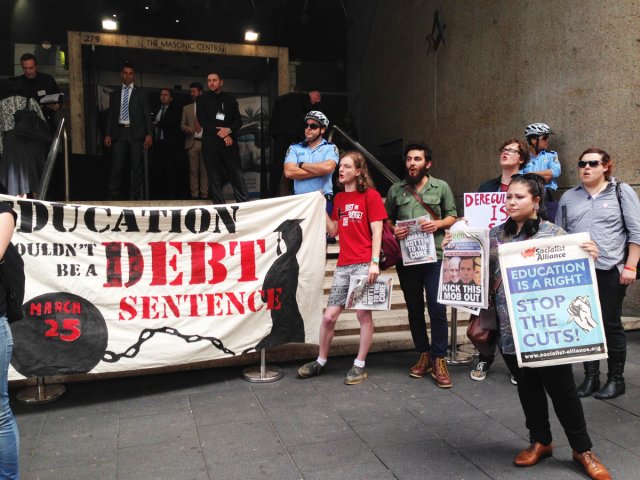
The Senate has voted down Christopher Pyne’s Higher Education Reform Bill, which would uncap university fees. This is the second time that the legislation has been struck down. It puts Tony Abbott’s government on aan uneasy footing.
The defeat of the bill comes after Pyne spent weeks on a campaign to bully and threaten crossbenchers in parliament. This strategy included threatening to cut $150 million of research funding to the National Collaborative Research and Infrastructure Strategy (NCRIS) if the bill was not passed.
Had NCRIS been defunded, 27 research facilities across the country faced closure, potentially costing up to 1700 highly skilled jobs that are funded by NCRIS. This, in turn, would have had knock-on effects on the roughly 35,000 scientific researchers working at NCRIS facilities. Amid a backlash, this strategy was quickly abandoned.
In the end, the combined votes of Labor, the Greens and a string of crossbenchers was all that was necessary to topple the bill, after more than a year of demonstrations by students, furious at plans to allow universities to massively increase fees.
The defeat of the bill is a cause for celebration for student activists who have fought hard to make sure this issue stays in the spotlight. Students engaged in an aggressive campaign to fight the reforms and contributed greatly to the failure of the government’s program. Importantly, these sorts of failures not only defend the living standards and conditions of students, but also go a long way to discrediting the government and its policies.
Students fought these reforms as the Abbott government was already facing a political crisis in the Senate. The government needs the support of crossbenchers to pass any legislation not supported by Labor and the Greens in the Senate. Chaos in the Senate gave students the opportunity to strike down deregulation.
Conditions may not remain so favourable, so it would be a mistake to relax at this point. Pyne may try to modify the bill to gain the support of crossbenchers. Most crossbenchers have made gestures towards wanting some form of austerity program implemented in the university sector, while opposing deregulation as it now exists. Pyne has already indicated that he will continue to push deregulation of the university sector as key to the Abbott government’s policy on the issue.
This is not a time to step back. Students need to press the advantage. Fee deregulation is the centrepiece of the Abbott government’s plan for the university sector and students need to keep fighting until it is dead.
It is unreasonable to believe that students can continue to remain on the defensive when it comes to threats to their education. A new model for education, one that is just and equitable, must be brought to the table if large numbers of students are to mobilise.
Such a model of education would have fully funded, free and open educational institutions, where students have access to a living income and a meaningful say in the way universities are run.
Experiences from around the world show us what is necessary. In Quebec, Chile and Germany, huge numbers of students, numbering in the hundreds of thousands, have mobilised to defeat restructuring of the university sector and in Chile and Germany, establish free education. In the Netherlands, students at the University of Amsterdam have continued a weeks-long occupation of university buildings in protest against course cuts.
These examples share a common theme: grassroots, popular organising that involves as many students as possible and uses these organic networks to mobilise huge groups of students in protest.
Without these huge, popular movements we cannot expect to mobilise or sustain a large enough student body to see similar demands pass through Australia’s parliament.
Like the article? Subscribe to Green Left now! You can also like us on Facebook and follow us on Twitter.